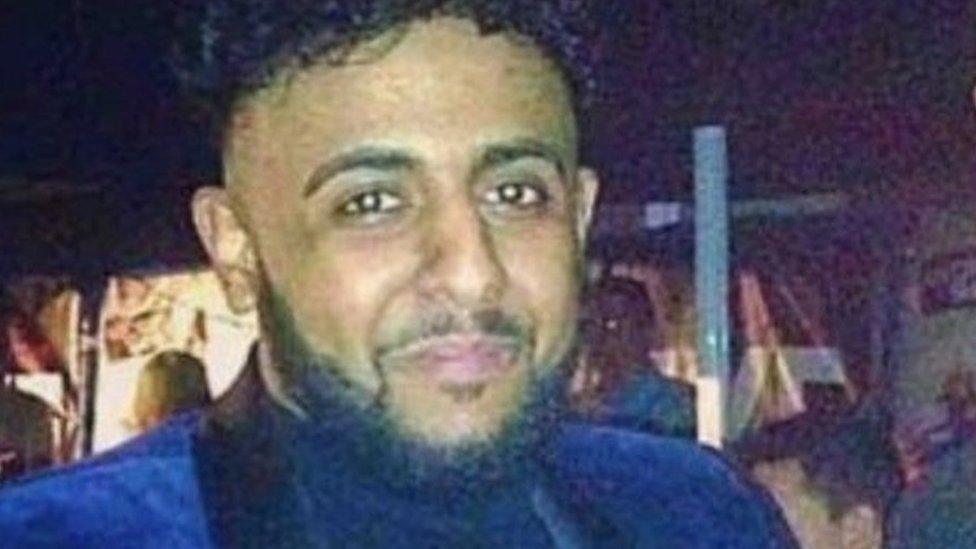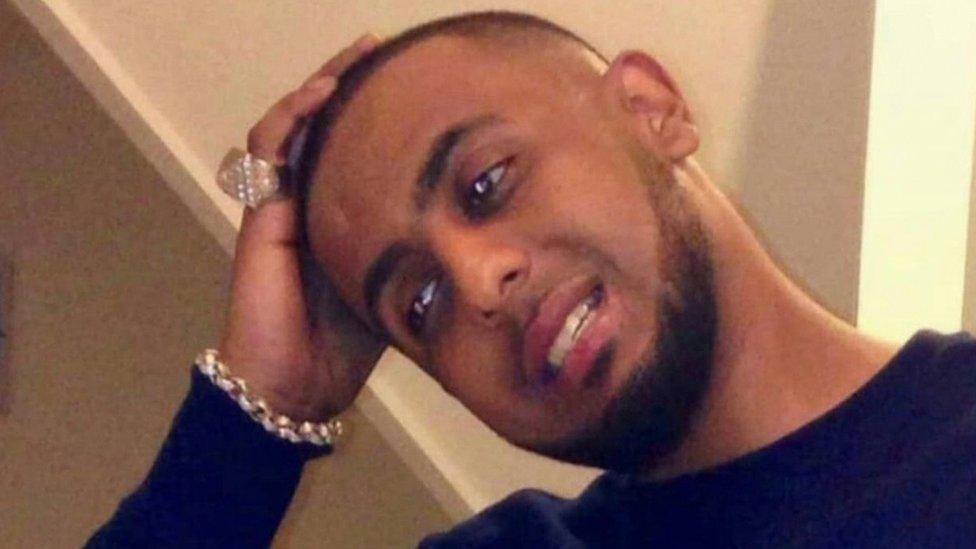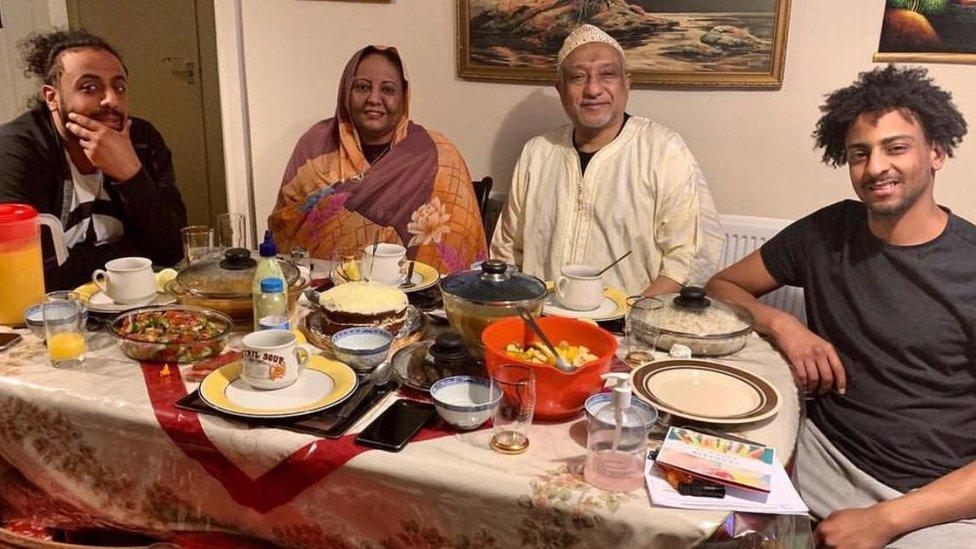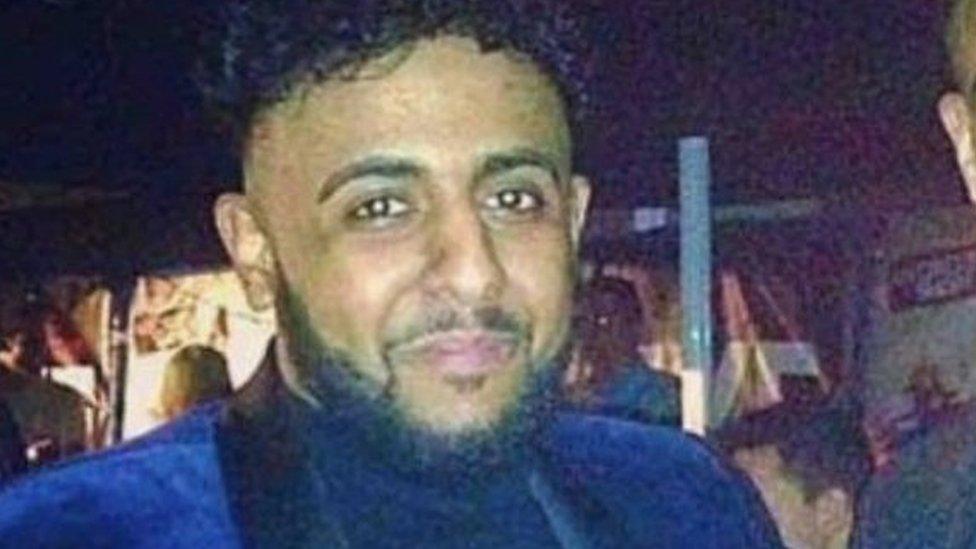Mouayed Bashir died from drugs after restraint, inquest finds
- Published

Mouayed Bashir was retrained by officers at this family's home and later died in hospital.
A man died from the effects of cocaine after becoming distressed and being restrained by police, an inquest found.
Officers restrained Mouayed Bashir, 29, at his home in Maesglas, Newport.
He then died in hospital in February 2021 after suffering a cardiac arrest in an ambulance.
After nearly three weeks of evidence, an inquest jury in Newport returned a narrative conclusion, with a coroner saying the actions of the police did not affect the outcome.
The inquest jury heard that Mr Bashir had acute behavioural disturbance (ABD) as a result of taking cocaine over a number of years.
ABD leaves a person extremely agitated or distressed, and can be made worse by restraint and the presence of police officers, jurors were told.
It can lead to bizarre aggressive behaviour, disorientation and unexpected strength following a release of adrenaline, the inquest heard.
The jury found that the police had "insufficient knowledge and understanding of identifying some of the signs of ABD".
It also concluded "the death was caused by cocaine intoxication. This was contributed to by ABD following a period of restraint".
A pathologist told the inquest Mr Bashir had a mix of drugs in his blood including cocaine and diazepam, and believed he was suffering from ABD as a result of cocaine use.

Mr Bashir was restrained by officers who handcuffed his arms behind his back, and strapped and taped his legs together for his safety
A medical expert said Mr Bashir could have died from the effects of cocaine alone.
Gwent senior coroner Caroline Saunders offered her condolences to the family and said she would be writing to the chief constable of Gwent Police about recognising the signs of ABD.
The jury previously heard that on the morning of 17 February 2021, Mr Bashir became unwell after taking drugs.
He barricaded himself in his bedroom at his home, and was on the floor after breaking furniture.
His parents called an ambulance and police, who forced their way into the room.
Mr Bashir was restrained by officers who said they handcuffed his arms behind his back, as well as strapping and taping his legs together for his safety, the jury heard.
Body worn camera images of the incident were shown to the jury, where Mr Bashir could be seen trying to kick out at the officers.
Ms Saunders directed the jury that only a narrative conclusion was appropriate, but they could consider contributory factors.

Officers were called to the Bashir family home after concerns for his safety
She told the jury having heard evidence that even if the police or ambulance service had acted differently, the outcome would have been the same.
The jury also considered whether the police officers attending should have recognised ABD, in light of having received training.
Ms Saunders accepted that even if ABD had been considered, the outcome would have been the same.
Mr Bashir suffered a cardiac arrest while being transferred to hospital.
After the inquest, Mouayed Bashir's brother Mohammed Bashir, said the family wanted ABD recognised and taken seriously in Wales.
He said: "We want better communications between agencies such as police and the ambulance.
"There is no excuse for both agencies not to recognise ABD and use one language to speak to one another."
Following the inquest, David Ford, director of the police watchdog the Independent Office for Police Conduct's (IOPC), said: "My thoughts remain with Mouayed's family and everyone affected by his untimely death.
"It is a tragedy that Mouayed died in the circumstances that he did and I am extremely sympathetic with the position that Mouayed's parents found themselves in during the medical emergency.
"They naturally wanted to help their son, who has sadly lost his life at a young age."
He added that the findings of the IOPC's investigation had been shared with the family and a report submitted to the coroner.
"Having reviewed the evidence carefully, we acknowledge that officers were faced with an extremely challenging situation and worked together to try to assist Mouayed and keep him safe until paramedics arrived," he said.
"While we found communication by some officers with Mouayed's family lacked empathy at times, we did not find any indication that the officers behaved in a manner that would justify bringing disciplinary proceedings.
"We identified a number of areas for further training and learning that we shared with Gwent Police. The force accepted our recommendations."
Related topics
- Published22 January 2024

- Published15 January 2024

- Published19 January 2024
